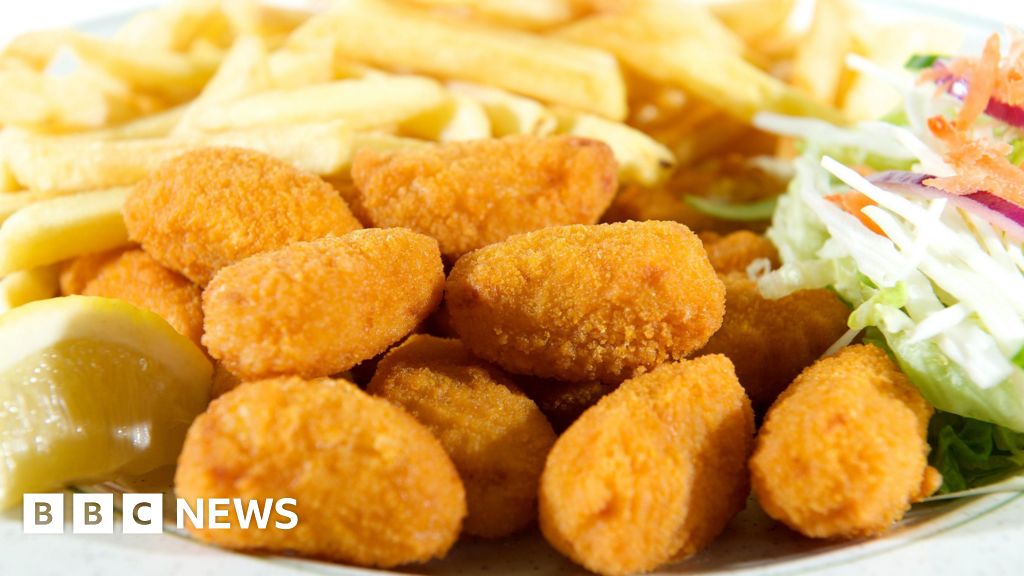Scampi is sourced in a way that causes “extensive environmental damage”, a charity complaining to the UK competitions authority has claimed.
Charity Open Seas is disputing the sustainability of the popular seafood snack and has asked the Competition and Markets Authority (CMA) to investigate supermarkets which claim it is “responsibly sourced”.
Open Seas says “extensive damage” is caused from trawling the seabed with heavy nets when catching langoustines for scampi, and other marine life caught in the process is often wastefully discarded.
The British Retail Consortium said retailers were “working closely” with suppliers to “ensure products meet customer expectations on sustainability”.
It added: “Retailers are committed to sourcing scampi responsibly.”
However, Open Seas believes describing the product as “responsibly sourced” breaches CMA guidance.
“We’ve raised these concerns with supermarkets, but they continue to sell scampi as ‘responsibly sourced'”, head of campaigns at Open Seas Nick Underdown said.
CMA guidelines require marketing claims to be both truthful and accurate, and “clear and unambiguous”.
“Consumers should not be misled by products being marketed in this way”, Mr Underdown added.
Scampi is sold in the frozen aisles of supermarkets, becoming a cheap source of protein for many. It is often made of a mixture of different crustaceans including prawns and lobsters. The variety that is covered in breadcrumbs, fried and served with a side of tartar sauce has become a bar snack staple.
But Mr Underdown told the BBC that there was “no effective vessel tracking” to reduce the harmful effects of catching nephrops, the group of marine life that predominantly makes up scampi ingredients.
“There is a vessel monitoring system but no means to monitor the composition of those catches”, he said, adding the level of “bycatch” – marine life caught unwittingly in the nets – can often include small animals and fish, which impacts the populations of that species in the future.
“Catching large volumes of young fish against scientific advice is not responsible. Trawling over fragile marine habitats is not responsible,” Mr Underdown said.
“Businesses failing to address these problems is not responsible. The way scampi is produced has all the hallmarks of an irresponsible fishery.”
In its complaint to the CMA, Open Seas said supermarkets’ claims that their fisheries were “responsible” was ambiguous, due to the term being “defined by a self-interested industry group without reference to international norms for defining responsible seafood”.
The UK’s largest manufacturer of scampi, Whitby Seafoods, states on its website that it is part of an industry-led Fisheries Improvement Project (FIP). Project UK, which oversees the implementation of the FIPs for the industry, is funded by industry players including Marks & Spencer, Morrisons, Sainsbury’s, Young’s, Lidl, Co-op, Tesco and Whitby Seafoods itself.
But Mr Underdown told the BBC he was “extremely concerned about inaccurate self-reporting and the lack of progress being made by” the FIP for the scampi industry.
The BBC has contacted the major supermarkets and suppliers of UK scampi.
Morrisons says on its site that it uses third-party certification to ensure its fisheries are “credible and sustainable”, with 99% of its farmed seafood “certified to global sustainable seafood initiative standards”.
Sainsbury’s meanwhile says it was the first-ever retailer to be awarded various accolades including one from the Marine Stewardships Council. M&S writes on its site that it sits on the Board of Trustees for Fisheries Innovation Scotland and that it is an active participant in a number of Fisheries Improvement Projects.
Young’s says it is part of several sustainability organisations, while Tesco says it is working with wildlife charity WWF regarding its seafood sustainability aims.
The Co-op says it works with three independent schemes to verify its seafood sustainability.

